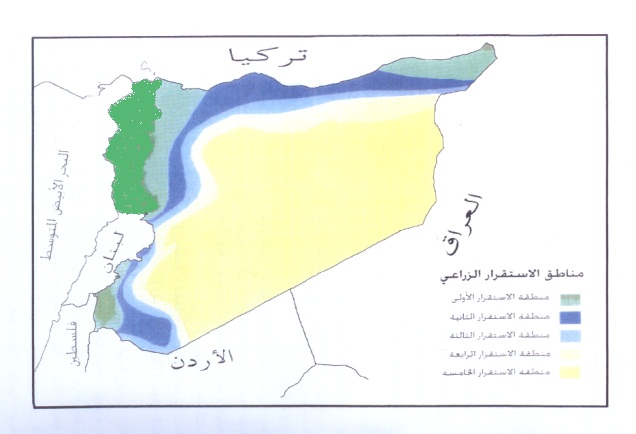The Agricultural Sector Is The Locomotive Of The Syrian Economy .. It Has Priority In Development And Self-Sufficiency And Food Security, Which Is The Main Factor To Support Economic Security .. Agriculture In General Is One Of The Most Important Components Of The Real Economy Productive And With Industry Is The Main Locomotive For Sustainable Development And Economic And Financial Stability.
Agriculture In Syria Occupies A Strategic Position Because It Provides Food For The People And Avoids The Country's Political And Economic Pressures Faced By Importing Countries. It Provides Great Employment Opportunities For A Large Sector Of Citizens. It Provides Raw Materials Of Plant And Animal Origin For Manufacturing Industries. Surplus Production.
The Total Area Of Syria Is 18.5 Million Hectares, Of Which 6 Million Are Arable, Which Constitutes 32.8% Of The Total Area Of The Country.
For More Details About Agricultural Crops And Agricultural Production In Syria Click Here To Download The Agricultural Statistical Group.
Based On The Annual Rainfall Rate, Syria Is Divided Into Five Climatic Agricultural Zones (Stabilization Zones), Consistent With The Topographic Classification Mentioned Above, And These Areas Are
First Stability Area:
It Has A Rainfall Of More Than 350 Mm Per Year And Reaches More Than 1000 Mm In Some Areas And Constitutes 14.6% Of The Country
Second Stability Area:
It Has An Annual Precipitation Rate Of 250 Mm To 350 Mm, Accounting For 13.3% Of The Country
Third Stability Area:
It Receives An Annual Rainfall Of More Than 250 Mm, Accounting For 7.1% Of The Country.
Fourth Stability Area:
An Area With Annual Yields Of Between 200 And 250 Mm. Accounting For 9.9% Of The Country.
Fifth Stability Area:
It Consists Of Desert And Meadows And Annual Rainfall Is Less Than 200 Mm.

According To Topographical And Climatic Features, In Addition To Some Other Characteristics, Six Agricultural Systems Can Be Distinguished. One Farming System Can Be Integrated Under Systems That Clearly Reflect Those Characteristics. These Agricultural Systems Are:
1 - Intensive Irrigated Coastal Agricultural System. It Is Characterized By Good Ecological Conditions Conducive To The Production Of Specialized Crops, Especially Citrus And Protected Crops.
2- The Agricultural And Mountainous System Of Agriculture, Which Is Characterized By The Cultivation Of 6 Olives, Apples, Cherries And Tobacco, The Latter Is The Only Strategic Crops In This System.
3 - The Agricultural System Of The Northern And Northeastern Plains, And This System Is Characterized By Its Dependence On Large Strategic Crops, Such As Wheat, Cotton, Barley And Lentils.
4 - The Agricultural System In The Middle Rainfed, Irrigated , Arid Regions And Algab, Which Is Characterized By The Cultivation Of Strategic Crops, Such As Wheat, Barley , Lentils, Cotton And Sugar Beet.
5- Agricultural Systems Of Plains And Semi-Arid Southern Mountains, Characterized By The Free Marketing Of Crops Grown In This System, Such As Legumes.
6- Pastoral Agricultural Systems And Pastoral Agriculture Of The Eastern Dry And Semi-Arid Plains.
Agricultural Development Processes And Intensive Production Plans, By Seeking Food And Driving Economic Growth, Have Led To Serious Environmental Damage. Environmental Problems Have Been Exacerbated By The Intensive Use Of Agricultural Inputs (Fertilizers And Pesticides), Leading To Soil Pollution And Degradation. Loaded With High Concentrations Of Pesticides And Fertilizers Have Led To The Contamination Of Water Resources, Which Led To Attention To Organic Agriculture, Which Is A Human Activity Is Environmentally Friendly As It Maintains A Healthy Environment And A Balanced Ecosystem
Experiments On Organic Agriculture In Syria
That The Development Of Organic Agriculture In Syria Began Since The Beginning Of The Year 2000 With The Attention Of The Ministry Of Agriculture Organic Agriculture When A Study On Organic Agriculture In Cooperation With Fao, And The Project Was Implemented Institutional Development Of Organic Agriculture In Syria In 2006, In Addition To The Issuance Of Decree No. 12 Of 2012 Of The Organic Production And The Creation Of The Directorate Of The Organic Production Office In The Ministry Of Agriculture, But The Organic Agriculture Sector In Syria Is Still In Its Infancy.
The Ministry Of Agriculture Is Working On This Sector In A Scientific And Thoughtful Manner. There Are Now Organic Farms For Olives, Karma, Cotton, Medicinal Plants And Fruit Trees, Specially Destined For Export To The European Markets. No Organic Products Are Imported To Syria. Of Local Varieties Of Fruit Trees And Vegetables Adapted And Resistant To Diseases And Spread Many Of The Crops Easily Eligible For The Transition From Traditional Agriculture To Organic Agriculture In Addition To The Syrian Farms Using Organic Fertilizers Instinctively.
We Conclude From The Foregoing The Syrian Government's Efforts To Develop Organic Agriculture In Syria Through Decree No. 12 Of 2012 On Organic Production, And Have Carried Out Many Experiments In This Field. However, The Farms Remain The Basis For The Generalization Of This Type Of Agriculture. The Importance Of Organic Agriculture And The Strengthening Of National Capacities And Expertise In This Field, And The Need To Provide The Necessary Support For The Launch And Continuity Of This Vital Project